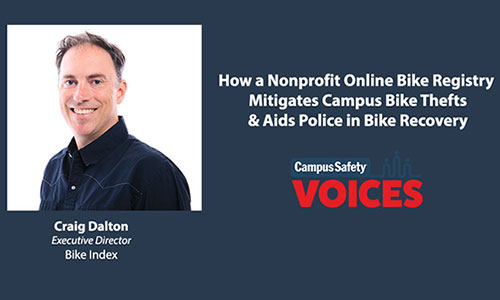A bicycle is stolen every 30 seconds in the United States, totaling roughly two million bikes per year and valuing at $350 million. Less than 5% of bikes are returned to owners, many of whom rely on their bikes to get to and from work or school.
Generally, there are two “categories” of bike thieves, the first being opportunists, says Craig Dalton, executive director of Bike Index, a nonprofit online bike registry.
“There’s a lot of opportunism when it comes to bicycle crime: unlocked bikes and a casual nefarious actor walks by and sees an opportunity to grab the bike and ride it off for the purposes of potential resale,” he told Campus Safety. “Or Maybe it’s just getting from point A to point B and they’re unscrupulous. They just take a bicycle.”
The other category is organized crime.
“We’ve publicized specifically a big case we uncovered in the state of Colorado where over $500,000 worth of bicycles were being stolen and then fenced out of Mexico. The FBI [was] involved,” said Dalton. “We started to see the kernels of this in our system through users. We were tracking online sales of these bicycles and we were finding that they were ending up in this one location. It’s a pretty amazing story. The DA named it Operation Vicious Cycle.”
College and university campuses are naturally prone to bike thefts due to a large volume of bicyclists in one general area. It’s estimated that one-third of college and university students have bikes. More than 50% of all property crimes reported on the University of California’s 10 campuses are for bike theft. In Fall 2021, UC Santa Barbara experienced the highest number of bike thefts in the last three years — up 85% from 2019.
One way for colleges to mitigate bike thefts and improve their chances of recovery is to encourage students and staff to register their bikes. When Bike Index was founded in 2013, it focused much of its efforts on developing point-of-sale integrations with popular systems that bike shops used to create automatic registrations. The organization then began receiving interest from police and universities. By 2017, Bike Index established its first partnership with a major university. Five years later, the nonprofit currently works with 76 colleges and universities across the country (18:15).
One of those campuses is UC Davis. Each year, approximately 500-600 bikes are reported stolen from the campus. Before adopting Bike Index, UC Davis used a bike licensing program operated by the state’s DMV.
“The program, while coordinated by a state agency, was only effective locally as each issuing department was charged with record keeping, database management, and the records were only available and referenceable by the registering organization,” Jeffrey Bruchez, UC Davis’ Bicycle Program Coordinator, said in an interview. “For example, if a bike registered at UC Davis were transported to San Francisco, the local agency would be unable to search for the registered owner’s information since the databases are not centrally referenceable.”
Looking to improve the chances of bike recovery, the school approached Bike Index. In the first 10 months, more than 3,900 bikes were registered — totaling approximately $6.64 million work of bikes. Every bike is entered into Bike Index’s national bike registry and remains registered and protected throughout its lifetime. Registration does not need to be renewed, even after graduation.
Another benefit of making the switch to Bike Index, said Bruchez, was increasing access to the system.
“Formerly, with the California Bike License System, the only avenue to get a bike registered was via our office, which would create a long line which reportedly could take several hours to get through,” Bruchez described. “Bike Index simplifies the process of registration notably, which I believe will make it a long-term outstanding success.”
In our interview, Dalton further explained about Bike Index works (10:02). We also spoke about:
- Challenges colleges/universities face regarding bike thefts and recovery (2:26)
- How Bike Index also works in conjunction with surrounding cities and towns, including police, to prevent bike thefts (26:49)
- Best practices for keeping a bike secure on campus (33:13)
Watch our full interview here or listen on the go on Apple or Spotify.









